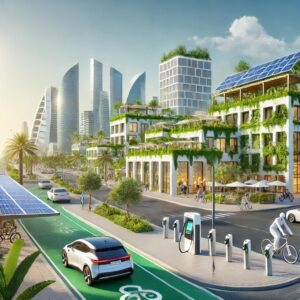In the heart of the Middle East, Bahrain is setting the stage for a groundbreaking shift toward sustainability, aiming to balance rapid development with environmental consciousness. As nations globally grapple with the pressing realities of climate change, Bahrain stands out with a bold roadmap that embraces renewable energy, green infrastructure, and cutting-edge technology to foster a resilient, eco-friendly future. The country’s sustainable development initiatives reflect its commitment to not only thrive in a shifting world but also to lead the region by example.
At the core of Bahrain’s green agenda lies an ambitious approach to renewable energy. Solar power projects are cropping up across the island nation, capturing the abundant sunshine to reduce reliance on traditional energy sources. These projects align with Bahrain’s National Energy Efficiency Action Plan, which envisions meeting a significant portion of the country’s energy demands through renewable sources by 2035. Government incentives are fostering private sector engagement, encouraging companies to adopt solar panels and sustainable practices in their operations.
One flagship project is Bahrain’s collaboration with the United Nations Development Program (UNDP) to construct a solar power plant in Al Dur, expected to generate hundreds of megawatts of clean energy annually. This project underscores Bahrain’s commitment to reducing its carbon footprint and serves as a template for neighboring countries seeking greener alternatives to fossil fuels.
In parallel with its energy initiatives, Bahrain is embarking on green city planning. Manama, the capital, is seeing a wave of eco-friendly developments aimed at creating a city that supports sustainable living from the ground up. The Eco-City project envisions green buildings, efficient waste management systems, and urban greenery that will revitalize neighborhoods and promote public health.
One distinctive feature of Bahrain’s Eco-City is its incorporation of water-saving technologies, essential for a desert environment with limited freshwater resources. Buildings in the Eco-City use advanced filtration and greywater recycling systems, ensuring that water use is optimized without compromising on residents’ comfort. These projects also embrace vertical gardens and green rooftops, creating urban oases that reduce temperatures and improve air quality—a forward-thinking step for a warming climate.
The road to a sustainable Bahrain isn’t just about renewable energy and green buildings; it’s also about reimagining how people move within the country. Bahrain is rolling out an electric vehicle (EV) infrastructure, incentivizing the adoption of EVs by both residents and public transportation services. Charging stations are becoming commonplace, and the government is considering subsidies and tax benefits to make EVs a practical option for Bahrain’s drivers.
Public transport, too, is evolving with sustainability in mind. Plans to introduce electric buses and create dedicated cycling lanes signal a move toward a transport system that reduces traffic congestion, lowers emissions, and offers citizens healthier, environmentally-friendly commuting options.
Bahrain’s sustainability efforts are not confined to government initiatives. The country is investing in educational programs that equip citizens and students with the skills and awareness needed to embrace greener lifestyles. From workshops on recycling to digital platforms that track personal energy use, Bahrain is nurturing a culture where everyone plays a role in environmental stewardship.
At the core of Bahrain’s green transformation is innovation. Partnerships with global organizations bring advanced technologies to Bahraini projects, allowing them to remain competitive and efficient. Digital twin technology, for instance, is being explored to optimize city planning and maintenance, while AI-driven systems enhance energy efficiency in real time. The result is a country not only prepared to meet today’s environmental challenges but also capable of thriving in a sustainable future.
Bahrain’s vision for sustainability is a blueprint for future Middle Eastern development. While challenges remain, the country’s commitment to renewable energy, green urban design, and public engagement is a sign of a hopeful, resilient future. By rethinking its urban infrastructure, adopting cleaner energy sources, and promoting eco-friendly transportation, Bahrain is well on its way to becoming a leader in Middle Eastern sustainability.
Bahrain’s approach proves that green innovation is not just possible but achievable in a way that preserves cultural heritage and modern aspirations. This journey not only paves the way for a sustainable Bahrain but also establishes a model for other nations to follow.

